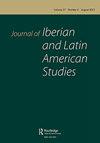国家的舞台:二十世纪的西班牙和拉丁美洲
IF 0.3
0 HUMANITIES, MULTIDISCIPLINARY
Journal of Iberian and Latin American Studies
Pub Date : 2020-09-01
DOI:10.1080/14701847.2020.1851916
引用次数: 0
摘要
本档案收集了一系列关于西班牙身份和展品之间纠缠关系的多学科实证论文。自19世纪以来,西班牙一直是世界展览的参与者和举办地,面对着传统表现和提倡的现代性之间的巨大分歧。尽管西班牙在经济上无法与其他西方帝国主义列强竞争,但由于其文化多样性,对过去伟大帝国的怀念,以及作为东西方、南北世界之间的异国边境的表现,西班牙的情况特别有趣。这里进行的研究主要集中在展览的国际范围,涵盖不同的跨国现象,在欧洲和拉丁美洲更广阔、更雄心勃勃的空间中插入不同的想象社区。值得注意的是,一些展览转化为在一个相互联系的西班牙世界中塑造集体身份的特殊工具,在这个世界中,后帝国西班牙的民族身份是连接国家和大陆的参考。最终,所有的文章都不再把展览作为不同身份建议之间象征性冲突的公共场所,而是作为集体记忆的单一场所。本文章由计算机程序翻译,如有差异,请以英文原文为准。
A stage for nations: Spain and Latin America on display in the twentieth century
ABSTRACT The present dossier collects a series of multidisciplinary empirical essays on the entangled relationship between Spanish identity and exhibits. Since the nineteenth century Spain has been both a participant and a venue for universal exhibitions, confronting itself with an imagery dramatically divided between traditional representations and an advocated modernity. Despite being a country incapable of competing economically with other western imperial powers, the case of Spain has a particular interest because of its cultural diversity, nostalgia for a past great empire and presentation as an exotic frontier between West and East, North and South of the world. The research studies carried out here mostly focus on the international scope of exhibitions and cover different transnational phenomena, inserting different imagined communities in wider and more ambitious spaces in Europe and Latin America. Notably, some exhibitions convert into special instruments for shaping collective identities in an interconnected Hispanic world in which post-imperial Spanish national identity is a reference to link countries and continents. Ultimately, all the essays move away from the examination of exhibitions as public arenas of symbolic conflict between different identity proposals as singular places of collective memory.
求助全文
通过发布文献求助,成功后即可免费获取论文全文。
去求助
来源期刊

Journal of Iberian and Latin American Studies
HUMANITIES, MULTIDISCIPLINARY-
CiteScore
0.40
自引率
33.30%
发文量
23
 求助内容:
求助内容: 应助结果提醒方式:
应助结果提醒方式:


